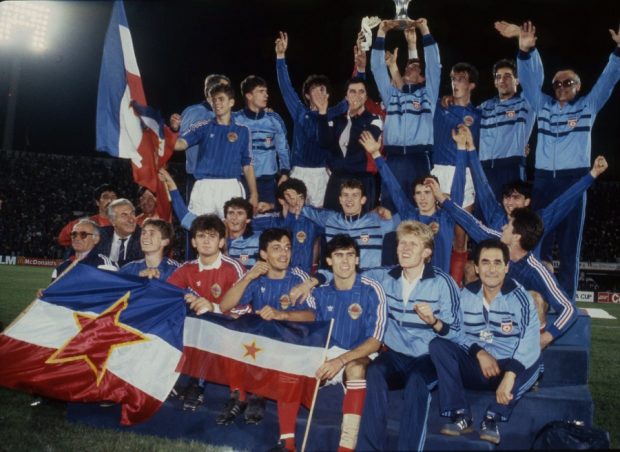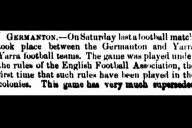“Hey, did you guys ever watch The Last Yugoslav Soccer Team? Now THERE’S a tearjerker…!” I ask my brother, his wife and my husband in a group chat. My brother and sister-in-law live in London, and have just told us how they were at the Southeast European Future Fest, a festival that “brings post-Yugoslav culture, music and architecture to Shoreditch for a one-day celebration of Southeast European creativity and heritage”. My sister-in-law mentions a cool doco that we must watch, Unwanted Heritage, and says that it made my brother cry.
Which reminds me of the aforementioned documentary that once made me bawl like a baby.
Turns out I remembered the title wrong; it’s The Last Yugoslavian Team (2000). This doco is mostly a retrospective, juxtaposed with present-day matches and former teammates’ post-war lives amid strained interethnic relations. In other words, totally lighthearted fare.
As I type this, it’s been 31 years since the Yugos achieved the seemingly impossible. The FIFA World Youth Championship took place in Chile in 1987, with the final played on October 25 in Santiago. This golden generation were dubbed Čileanci (the Chileans), and to this day when the moniker is used most people will know exactly who is being referenced. Zvonimir Boban scored in the 85th minute, two minutes later West Germany got a penalty and equalised. In the end, it went to a penalty shootout and Yugoslavia emerged victorious.
Red Star Belgrade superstar Robert Prosinečki won the Golden Ball for the tournament, with Davor Šuker just one goal behind West Germany’s Marcel Witeczek for the Golden Boot. Prosinečki would go on to become one of Yugoslavia’s (and Europe’s) brightest stars, attaining near-legend status in the ex-Yu region. Prosinečki was instrumental in Red Star famously winning the 1991 European Cup, where they beat the then “galacticos” of Marseille.
I get a little nervous as the opening scenes of the doco flash in front of me. It’s weird and yet terribly familiar, this perturbed feeling. Part of you expects that you can observe as though from the sidelines, maybe even be a little blasé. Because, after all, it’s not like you haven’t traversed this road a gazillion different times. Well, fat chance.
There is always something unnerving about revisiting a period you personally survived. A mix of disbelief and disgust and contempt, and an almost tangible sorrow. A bit of survivor’s guilt wedged in, too. (It’s a miracle I’m still a vivacious optimist, quite frankly.) I can’t not watch this, though. It feels important to revisit, somehow.
It’s not that it hasn’t carved itself into your marrow, though. It lives there, loiters listlessly, and hovers sporadically between your eyes like an invisible tattoo, and right below the surface of your epidermis, too, just waiting to emerge (pounce, even), and whizzes between synapses, finding ways to insinuate itself into conversations it should otherwise have no business interrupting. We joke about it with our Serbo-Croatian/Bosnian friends, how (occasionally) conversations somehow lead back to war, even during happy circumstances; how war rudely, garishly shoehorns its way in like an inebriated lout that you have to placate. Sometimes you can’t tell it to sod off. It’s a compulsion, you see, this need to dissect that which we’ve attempted to dissect and analyse countless times, to try and determine, and yet…and yet. It’s like we think we’ll reach a different conclusion this time around, perhaps get the answers we still desperately seek. “Why, how? Why?” We get a little pissed off at ourselves, too, that we can’t stop prating on about it, that it’s marked us for life (even though we’re predominantly sanguine and content), that we keep parroting the same things about everyone being the same, interethnic love, about those who shun it, those who tragicomically look through the prism of “XYZ ethnicity is bad”.
Again with the “Why, how? Why?” We know, and yet we know nothing.
Vuk Janić’s film opens:
“Yugoslavia and Croatia, two states at war not long ago, are drawn in the same group for the European Championship 2000. Both teams were favourites. Only the group winner qualifies directly for the European Championship 2000 in Holland and Belgium.”
The sound of an emergency siren is heard. (If I never hear that chilling, godawful sound again, it’ll be too damn soon.) We cut to NATO bombing Belgrade till kingdom come, unleashing a torrent of firepower. Cue scenes of flashing bombs in the night sky, explosions, people running, burning buildings. (Note: NATO bombed civilian targets like hospitals, bridges, and the public broadcaster.)
“The first leg was to be played in Belgrade in the spring of 1999. But the Kosovo crisis meant the match was postponed till August 1999. The return was played in Zagreb in October 1999.” (Sidebar: as most of you would know, by that point “Yugoslavia” was just Serbia and Montenegro.)
Pedja Mijatović (Real Madrid) is in his swanky Madrid house, and says that one has to think from the point of view of everything that has happened—the war, the breakdown of Yugoslavia—in some way had to happen. “We’re now rivals. Sporting-wise, and whichever way you like.”
Zvonimir Boban (AC Milan) states that it’s natural that everything is bigger and far more intense ahead of this upcoming match in Belgrade. After all, it’s the first time the two national teams are meeting, two countries that until recently were at war. “That’s the way life went; those are paths that…history made it that way.” He mentions that this needs to be accepted, to go forward positively.
August 18, 1999. Belgrade, Serbia. Trams, cars, buses; the residue of NATOed buildings. The first match is nigh. Rows of cars, people wait sadly with empty canisters for petrol. A group of hooligans do a horrendous chant about slaughtering Croatians. This is the part where I, a Serb from Croatia, hide behind my hands and groan loudly.
The stadium is at fever pitch, the roars deafening. I bite my lip as the two (now) rival teams come through the tunnel. It’s in slo-mo, and Boban glances first at Mijatović, looks away, and Mijatović looks over at Boban, too. A seemingly simple shot, yet one fraught with so much meaning, poignancy, that it makes my chest clench (and again, when Boban and Mijatović embrace warmly, after the coin toss and the anthems). The match ends in a 0-0 draw.
Boban muses that there’s no point “being pathetic” and returning to the past, and to never again think about being united; it always brings malevolence. Boban mentions the jeering of the Croatian anthem, remarking matter-of-factly how the Yugo hymn was never his anthem; his was always the Croatian hymn.
Siniša Mihajlović (Lazio Roma) demurs. He’s sitting on a football pitch, leisurely leaning back on his hands, and he says, well, it’s easy to say that now, after everything; why didn’t he have the balls to say it back then? Mihajlović found it funny listening to the two anthems because until yesterday they all played together for the one side, team. They cheered and commiserated together, and fifteen years prior no one could have imagined what awaited them. (Note: Mihajlović was part of the golden generation but not called up to Chile, as he didn’t sign with Dinamo Zagreb, despite the national coach making that a condition of going to Chile.)
Meanwhile back in Chile, Yugoslavia meets Brazil in the quarter final. Mijatović mentions that Brazil played fantastically and opened the score. Mijatović equalised early in the second half after jumping high in the air to meet a Boban cross. “I didn’t believe it was me when I watched it later on TV.” In the 90th minute, Prosinečki scored the second and deciding goal courtesy of a stunning long-range free kick. 2-1 for Yugoslavia. “It was mayhem,” Mijatović says, as the lads jump and celebrate.
A lot has changed since Chile, though Boban admits everyone played with utmost respect for the Yugo jersey. The 1987 championship remains a highlight of his career from both an emotional and sporting standpoint; they gave their all for Yugoslavia to achieve the best possible result. We see Boban score in the final against West Germany, sprint off-pitch, over the athletics track and towards the fans. “It was huge happiness. It was the realisation of boyhood dreams,” he says.
Golden generation. The lads celebrate, hoist the cup in the air.
“In that moment we became players,” says Mijatović.
Ivica Osim (manager of Sturm Graz) lauds the Chile generation before running into Dejan Savićević (ex-AC Milan, now Rapid Wien); their teams are about to meet in an Austrian league match. My heart soars as they hug, kiss, exchange pleasantries and good-natured jokes about putting on weight, and promise to catch up after the match. Dejan wasn’t part of the Chile generation but was close with many of them, and was part of the 1990 World Cup squad. Osim was the coach of that last Yugoslavian team. I adore Osim.
The infamous Maksimir riots between Dinamo Zagreb and Red Star Belgrade “fans” on May 13, 1990 (also referred to as “the day Yugoslav football died”) are a key harbinger of doom, which culminated in Boban high-kicking one of the police officers. The riots are, frankly, disturbing to watch. Boban says he feared for the policeman afterward, “But he hit me first. Jesus said ‘turn the other cheek’, but he didn’t say if he hits you on the other cheek what you should do.” Osim echoes my thoughts when he remarks people were using any excuse for provocations, for things to blow up. “It was clear manipulation, which continues to this day.”
“Everything that had to do with unity and Yugoslavism was attacked with ugly expletives,” a news voiceover says, referencing the pre-World Cup friendly against Holland in Zagreb on June 3, 1990. The best illustration of the situation was Yugoslavia’s Hadžibegić turning to the team and quipping, “The eleven of us against 20,000, let’s go,” as the crowd chants “Hrvatska” (Croatia). Osim derides the situation, saying he sardonically “congratulated” the crowd as he applauds then waves them off dismissively. Hitler is mentioned. “Not that I’m comparing anyone to Hitler, I just mean those changes, how things are manipulated, the propaganda machine begins to work, Goebbels-types start to appear, the masses are manipulated.”
Osim coaches Yugoslavia to a Round of 16 victory over Spain at 1990 World Cup, Sarajevo sees jubilation in the streets and chanting of “Yu-go-slavia!” Bosnia and Herzegovina was the most invested in that victory and held out the biggest hope, perhaps given the sense of foreboding. “The feeling of danger and fear was palpable, and present in everything. Maybe it’s pretentious to say, but maybe that national team and the success presented the only chance they saw for impending doom to be halted in its tracks,” Osim points out.
I wince when Boban says, “I would die for Croatia. She’s my reason for living. The only reason. I love her like I love myself.” As someone decidedly non-jingoistic, I find these words…perplexing, to say the least.
Mihajlović is with his parents in Rome, saying he didn’t know what he was, Serbian or Croatian. Siniša considers both the same and the family (a “mixed marriage”) felt like Yugos. We later see his childhood home (in Vukovar), much of it destroyed.
Savićević ponders the present and “our collective tragedy” which never would have happened if people had thought about unity. Osim mentions bittersweet instances during the war when opposing forces would play football during ceasefires. Football trumps war, and a football game is “a nice kind of war, not the bloody kind”.
Belgrade, May 1992; Osim’s resignation press conference.
“It’s hard for me to say this…resignation is the most direct thing, for someone to say ‘I’m leaving and it’s over’. I’m telling you —and I’ve already repeated this —that I don’t believe I can go, nor will I go to Florence or to Sweden [for UEFA]. This is a private gesture of mine, and you can interpret it however you like. It’s a personal decision, and I won’t go into specifics. You all well know why. But if nothing else, if the only thing I can do for that city…so that you too remember that I was born in Sarajevo, and you know what’s happening there.”
The presser ends with Osim fighting back tears as he says, “…toliko.” (“That’s it.”)
Sarajevo, spring 1992. The siege begins. Carnage, burnt-out trams, shelling, soccer pitches as makeshift cemeteries. Devastating, eerie scenes. Yugoslavia is banned, kicked out of Euro 1992. It seems sport isn’t just sport, as Mijatović had hoped. Osim hits the nail on the head when he says people try to escape from what happened and from themselves. “Wherever you go, it’s present, it stays.” Osim deems it perhaps ugly to say that it’s easier for those who died, because “there is a sea of people whose souls have died; they’re living but no longer alive.”
October 9, 1999. Zagreb, Croatia v Yugoslavia, the return match. Things come full circle: just as the Serbs did in Belgrade, now we have Croatian chauvinist chants about—you guessed it—slaughtering Serbs. They’re both as bad as each other.
Savićević talks about being in Zagreb, when a heckler yells “You’re a piece of shit!” In one of the more hilarious and cringeworthy scenes, Dejan proceeds to rain a barrage of colourful Balkanesque profanities at the culprit, ones that defy translation, then continues with the interview as if nothing happened.
Osim watches on TV at home. Boban isn’t playing, watches from the sidelines. Croatia score first. Mijatović equalises, the camera cuts to President Tuđman grimacing and looking pained. Yugoslavia score again, and Croatia equalise. In between, we see a few tackles, some pushing, and a hilarious and blatant dive. Šuker and Mihajlović are running together and laughing, they high-five each other, and we cut to Osim and his sweet, sad eyes as he watches the match, a plaintive piano-violin score plays and my eyes become sad as well.
The match ends in a 2-2 draw. Yugoslavia finish top of the group and qualifies for Euro 2000. “We were close. Serbia will get sanctions so we’ll go to Euro,” a young man snipes.
The Yugo players are on their plane, toasting amid take-off, and singing an old folk tune, Sneg je opet, Snežana (It’s Snowing Again, Snežana).
It’s easy (and, I suppose, futile) to lament the whatcouldhavebeens. Lord knows my family, friends and I have exhausted that topic to the point of absurdity. The Čileanci were boys, young men, sharing a common language, sharing common ground, culture. There is so much beauty and similitude in the six nationalities of Former Yugoslavia, so many wonderful, colourful, interconnected threads, so many parallels and points where they all intersect and blend and you can’t tell where one ends and the other begins. Countless similarities to point to and celebrate, far more than any perceived or alleged “differences”. I like to say that, really, we’re all the same. This bothers some people. How can “sides” exist, I wonder, when we’re all brethren, and when we didn’t choose what ethnicity we were born into?
I wish so much (as do most people “on all sides”) that it all could have been stopped, the colossal human tragedy and horrific bloodshed thwarted.
That the only wars were the ones we’d always had – the nice kind, as Osim said, the football kind.
Feature photo courtesy of Sansasport
A French subtitled version of The Last Yugoslavian Team can be seen on YouTube
















